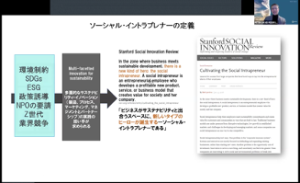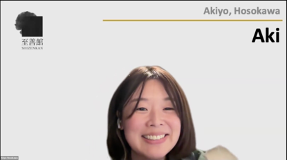On January 15th, Shizenkan University had an online open class on the topic of Social Intrapreneurship presented by Professor, Peter D. Pedersen. The class began with the question, “Are you job crafting now?” Job crafting is a new concept of work that differs from mass-production type work t where the employee adds his/her own taste to the work to make it worthwhile. Intrapreneurship is positioned as one approach to job crafting.

Post-its, now an indispensable office supply, was born when a failed adhesive that stuck but came off easily was commercialized as a ” sticky bookmark”. The story of the Post-it’s birth is known as a typical example of intrapreneurship, in which employees took the initiative and created new value without leaving the company. On the other hand, Professor Pedersen says, “Entrepreneurial activity within an existing organization is very difficult.” This is because “organizations often have bureaucratic rank-and-file members who don’t like change, such as those who are precedent-driven or stick to the status-quo, and it requires a change in the entire system and rigid mind-set.” Employees must also strive to “collaborate across silos and barriers” and “tell their own ‘story’ of ‘vision’ and use the values they share with diverse stakeholders as a persuasive factor”. The class included interaction with participants through a Zoom poll. The question, “What do you think are the qualities necessary for an intrapreneur?” was answered with key words and phrases such as “dream, imagination, and ability to get involved,” which prompted participants to think about the qualities they themselves will need in the future.
During the Q&A session, participants asked questions such as, “To what extent should organizations manage intrapreneurial ideas after adopting them?” and “What are the reasons for the difficulty in creating intrapreneurs in Japan? In answering such questions, Professor Pedersen introduced a contrast between Japan’s high-context society, where statements and deviations that disrupt the whole are not tolerated, and Western-style society, where words are weighed and the output is assumed to be provided from Day 1. He also pointed out to employees working in Japanese companies, “Even in situations where it is not necessarily required to transcend organizational barriers, it is important for employees to have the spirit and motivation to win “liberation” by fighting with their backs to the wall.

Akiyo Hosokawa(2023 Shizenkan graduate), shared her impressions of Professor Pedersen’s class and her learning at Shizenkan. When asked about what she learned at Shizenkan, she replied, “I think I acquired the ability to ‘make things work’ through the repetition of a vast amount of inputs and outputs.” Looking back on her two years at Shizenkan, she recalled, “I have never heard anyone say that they wish they had never gone to Shizenkan. It was difficult to live a life in which I was constantly being pushed to meet deadlines and had to run around in ways I didn’t understand, but I was able to overcome this because I was with my classmates.”

Through the social intrapreneurship course at Shizenkan, students will also learn about the challenges that intrapreneurs face in their organizations and how to overcome hardships through the perspectives of experienced and practicing intrapreneurs. If you are interested in learning the philosophy and practical skills of an intrapreneur leading to solutions to social issues, we encourage you to knock on the door of Shizenkan.
For more event information, please check our upcoming open class schedule here.
